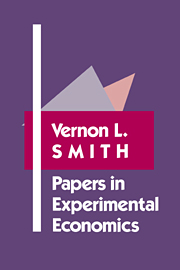Book contents
- Frontmatter
- Contents
- Preface
- Acknowledgments
- Part I The Formative Years
- Part II Institutions and Market Performance
- Part III Public Goods
- Part IV Auctions and Institutional Design
- Introduction
- 25 Incentives and Behavior in English, Dutch and Sealed-Bid Auctions
- 26 Theory and Behavior of Single Object Auctions
- 27 A Test that Discriminates Between Two Models of the Dutch-First Auction Non-Isomorphism
- 28 Theory and Behavior of Multiple Unit Discriminative Auctions
- 29 Theory and Individual Behavior of First-Price Auctions
- 30 A Combinatorial Auction Mechanism for Airport Time Slot Allocation
- 31 Designing ‘Smart’ Computer-Assisted Markets
- PART V Industrial Organization
- Part VI Perspectives on Economics
29 - Theory and Individual Behavior of First-Price Auctions
Published online by Cambridge University Press: 06 July 2010
- Frontmatter
- Contents
- Preface
- Acknowledgments
- Part I The Formative Years
- Part II Institutions and Market Performance
- Part III Public Goods
- Part IV Auctions and Institutional Design
- Introduction
- 25 Incentives and Behavior in English, Dutch and Sealed-Bid Auctions
- 26 Theory and Behavior of Single Object Auctions
- 27 A Test that Discriminates Between Two Models of the Dutch-First Auction Non-Isomorphism
- 28 Theory and Behavior of Multiple Unit Discriminative Auctions
- 29 Theory and Individual Behavior of First-Price Auctions
- 30 A Combinatorial Auction Mechanism for Airport Time Slot Allocation
- 31 Designing ‘Smart’ Computer-Assisted Markets
- PART V Industrial Organization
- Part VI Perspectives on Economics
Summary
Abstract
First-price auction theory is extended to the case of heterogeneous bidders characterized by M-parameter log-concave utility functions. This model, and its specific two-parameter constant relative risk averse special case, is generally supported by the results of 47 experiments. The one-parameter special case that comprises most of the theoretical literature is not supported by the experiments. One anomaly for the two-parameter model is that too many of the subjects exhibit positive (or negative) intercepts in their linear estimated bid functions. Accordingly, we develop a specific three-parameter model, which introduces a utility of winning, and a threshold utility of surplus. The new model, tested directly by introducing lump-sum payments or charges for winning, is not falsified by the new experiments.
We develop a generalization of noncooperative equilibrium models of bidding in the first-price sealed-bid auction (hereafter, the F auction). In our model, individual bidders can differ from each other in any way that can be represented by a finite number (M) of parameters (and satisfies certain regularity conditions). Our model, which we call the log-concave model, permits bidder preferences for monetary payoff to be risk averse, risk neutral, or risk preferring, although every bidder's utility function for monetary payoff must be less convex than the exponential function.
- Type
- Chapter
- Information
- Papers in Experimental Economics , pp. 623 - 661Publisher: Cambridge University PressPrint publication year: 1991
- 5
- Cited by



